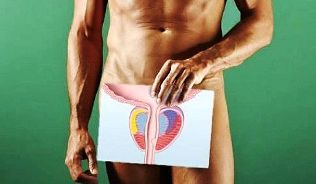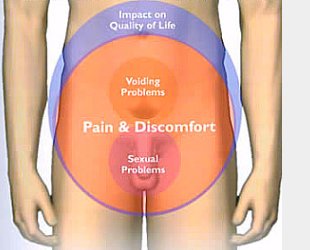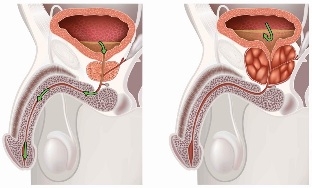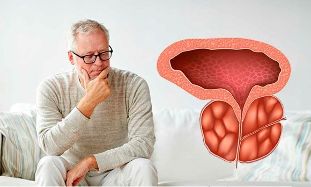Chronic prostatitis is long term inflammation of the prostate gland, leading to impaired morphology and function of the prostate. Chronic prostate inflammation occurs prostate triad of pain in the pelvic area and genitals, urinary system disorders, sexual disorders. The diagnosis of chronic prostatitis includes palpation of the thyroid gland, study of prostate secretion, ultrasound, uroflowmetry,, needle biopsy of the prostate. Chronic prostatitis shows complex medical, physiotherapy, massage prostate, instillation into the posterior urethra. Surgical treatment is recommended in complicated forms of chronic prostatitis.
Chronic prostatitis

Chronic prostatitis is a common male disease: about 50% of men suffer from some form of inflammation of the prostate. Chronic prostatitis often affects men aged 20-40 years, years, the largest sexual and reproductive health activities. In this regard, detection and treatment of chronic prostatitis urology is becoming not only a medical but also a social perspective.
Classification of chronic prostatitis
According to the modern classification of prostatitis developed in 1995, we distinguish 3 groups of the disease:
- I. Acute prostatitis.
- II. Of chronic prostatitis of bacterial origin.
- III. Chronic nonbacterial prostatitis Genesis/chronic pelvic pain Syndrome – a syndrome that is not associated with obvious signs of infection and continue for 3 months or more.
- III chronic prostatitis is an inflammatory component (detection of the prostate secretion white blood cells and infectious agents);
- III B chronic prostatitis is an inflammatory component (leukocytes and pathogens in prostatic secretion).
- IV. Asymptomatic chronic prostatitis (no complaints for the identification of leukocytes in prostatic secret).
The presence of a contagious part of talking to bacteria (infection) chronic prostatitis; in the absence of microbial pathogens – nonbacterial (no-contagion) prostatitis. It is believed that 90-95% of all cases are non-bacterial chronic prostatitis and only 10-5% is bacterial.
Causes of chronic prostatitis

The etiology and pathogenesis of chronic bacterial prostatitis is associated with any infection of the prostate following ways: upwards (through the urethra), downwards (when the reflux of infected urine from the bladder), hematogenous (blood highways) or lymphogenous (lymphatic collectors). Most uropathogens are E. coli, Klebsiella, Proteus, Staphylococcus, Enterococcus, CORINE, fungal, parasitic and viral pathogens. Together with the non-specific flora the development of chronic prostatitis can participate in the authors specific urethritis (chlamydia, Mycoplasma, gonococcus, Trichomonas, Gardnerella).
However, the development of chronic prostatitis is not so much the presence and activity of micro-organisms, because the state of the pelvic organs and blood circulation in them, the presence of comorbidities, the level of protection mechanisms.
Therefore, the emergence of chronic prostatitis can contribute to a number of factors. First of all, it urological diseases, pyelonephritis, cystitis, urethritis, stricture of the urethra, increatos until the end of the acute prostatitis, orchitis, epididymitis etc. Microbial etiologista can get into the prostate from distant foci of infection, for example, sinusitis, tonsillitis, dental caries, chronic bronchitis, pneumonia, pyoderma, etc. Exposed to chronic inflammation, local and General hypothermia, overheating, stay in humid environment, fatigue, malnutrition, rare urination, etc.
Chronic non-bacterial prostatitis is usually associated with congestive (congestive) phenomena of the prostate caused by stasis of venous blood circulation in the pelvic organs and impaired drainage and the spices of the prostate. Local obstructor causing an overflow of blood vessels in the prostate blood, swelling of incomplete emptying of secretions, breach the barrier, secretory, motor, the contractile function of the glands.
Congestive changes generally are caused by behavioral factors, long-term sexual exploitation, in practice, interrupted or prolonged sexual activity, excessive sexual activity, lack of exercise, prolonged sitting, chronic intoxication (alcohol, nicotine, drugs), occupational diseases (vibration). The development of chronic nonbacterial prostatitis predisposing pathology of the pelvic organs and neural structures, their innervation (eg. spinal cord injury), adenoma of the prostate, hemorrhoids, constipation, androgenodeficiency, etc. reasons.
The symptoms of chronic prostatitis
Chronic prostatitis is manifested by local and General symptoms. Local manifestations include prostate triad, which is characterized by pain, dysuria and sexual dysfunction. The pain of chronic prostatitis is a constant aching in nature, localized in the perineum, genitals, suprapubic, groin. Pain syndrome increases at the beginning and at the end of urination, pain radiating to the glans of the penis, the scrotum, sacrum, the rectum. The pain may increase after sexual intercourse or in connection with long-term abstinence; to weaken or strengthen after orgasm becomes more intense at the moment of ejaculation.
The intensity of the pain syndrome in chronic prostatitis varies from discomfort to Express that violate the sleep and performance manifestations. Pain in the restrict the localization the sacrum is often considered the low back pain or sciatica contact with the patient long treated without medical help.

Urination chronic prostatitis and painful learning. Although there may be difficulties in the beginning of the miscela, a weakening or discontinuity of urinary stream, feeling of incomplete emptying of the bladder, frequent night urination, burning in urethra. Urine chronic prostatitis can detect the presence of floating threads. After a bowel movement or physical exertion of the urethra seem to share , because of reduced tone in the prostate. Chronic prostatitis can cause itching, feeling cold or excessive sweating of the branch, the local discoloration of the skin, is associated with stagnation of blood circulation.
Chronic prostatitis is associated with severe disorders of sexual function. The phenomena of hypotension may be aggravated, painful erection, prolonged and frequent night erections, difficulty or early ejaculation, loss of libido (decreased libido), removed the orgasms Hematospermia, infertility. Sexual dysfunction is always hard for the experienced man, which leads to psycho-emotional disorders, even neurosis and depression, even more worsen sexual function.
Exacerbation of chronic prostatitis is associated with a slight increase in body temperature and deterioration of health. The general condition of chronic prostatitis is characterized by increased irritability, drowsiness, anxiety, fatigue, loss of appetite, sleep disturbance, impaired work ability, creative and physical activity.
Nearly a quarter of patients with chronic prostatitis symptoms for a long time absent, resulting in late treatment urologist. Long duration of chronic prostatitis can be complicated by impotence, vesiculitis, epididymo orchitis, male infertility, incontinence, stone formation, blisters, prostate, disease of prostate, development of adenoma and prostate cancer.
The diagnosis of chronic prostatitis
Necessary for the diagnosis of chronic prostatitis data is obtained from comprehensive laboratory and instrumental research. Tentatively suspected of chronic prostatitis are the clarification of anamnesis and complaints, perform an external inspection of the genital discharge, ulcer, irritation, a digital rectal examination of the prostate, with the aim of determining the shape, boundaries, consistency, tenderness of the breast.
To determine the structural and functional changes of the prostate, is shown holding ultrasound of the prostate (TRUS). Important methods of diagnosis of chronic prostatitis include the study of the secret prostate, urinalysis, bacteriological examination a smear from the urethra and urine, 3 cups of urine samples, PCR and REEF research scraping pathogens genital infections, determination of prostate-specific antigen (PSA).
Clinically significant chronic prostatitis is the detection analysis, the causative agents of chlamydiosis, mycoplasmosis, herpes, cytomegalovirus, trichomoniasis, gonorrhea, candidiasis, and nonspecific bacterial flora. The fence prostate secretion research, when urination and massage the prostate. The symptoms of chronic prostatitis there is a growing number of cells in the visual field, reducing the number of lecithin granules, pathogenic micro-organisms.
In general urine analysis in chronic prostatitis may show pyuria, pyuria, erythrocyturia. A bacterial urine culture will help identify the degree and nature of bacteriuria. With reproductive disorders shows a study of sperm and MAR-test.
To what extent and causes urination to help determine, urodynamic studies (uroflowmetry, cystometry, profilometry, electromyography). Using data from studies of chronic prostatitis has been possible to distinguish between stress incontinence, neurogenic bladder, etc. When hematuria, Hematospermia, obstructive voiding is endoscopy, urethroscopy, and cystoscopy. To remove the adenoma and the prostate cancer requires the determination of PSA, in some cases, a biopsy of the prostate with the morphological study of tissues.

Chronic prostatitis
Chronic prostatitis treatment difficult, but remember that recovery is still possible and depends largely on the mood of the patient, the timeliness of his appeal to the specialist compliance with all the requirements of the urologist. The mainstay of treatment of chronic bacterial prostatitis antimicrobial therapy is in accordance with antibiotics at least 2 weeks. To reduce pain and inflammation anti-inflammatory drugs to appoint ; to relax the muscles of the prostate, the restoration of urodynamics and outflow of prostate secretion shows, reception-blockers.
With the aim of improving drainage of the prostate, local microcirculation and muscle tone are considered during the therapeutic massage of the prostate. Massage of the prostate gland would result in the distribution of not less than 4 drops of prostatic secretion. Prostate massage is contraindicated in acute bacterial prostatitis, abscess of the prostate, hemorrhoids, stones in the prostate, rectal fissures, hyperplasia and prostate cancer.
Relieve pain syndrome chronic prostatitis can be recommended paraprostatic blockade, acupuncture. Important in the treatment of chronic prostatitis is a physiotherapy appointment of drugs, electrophoresis, ultrasound, phonophoresis, magnetic therapy, laser magneticam illic, inductometer, mud therapy, SMT, hot hip bath the temperature is 40 – 45°C, enemas with hydrogen sulfide and mineral waters, the instillation of the urethra.
With the development of complications of chronic prostatitis surgical treatment: the removal of strictures of the urethra; TUR of the prostate or the prostate when the disease of the prostate; transurethral resection of the bladder with multiple sclerosis on his neck, puncture and drainage of cysts and abscesses of the prostate; circumcisio with phimosis caused by repeated urinary tract infections, etc.
Prevention of chronic prostatitis
Prevention of chronic prostatitis requires compliance with genital hygiene, timely treatment of urinary-and genital and extragenital infections, the normalization of the regularity of sexual life, adequate exercise, to prevent constipation, timely emptying of the bladder.
In order to avoid a recurrence of chronic prostatitis necessary dynamic checks andrologist (urologist); preventive courses of physiotherapy, multivitamins, immunomodulators, with the exception of hypothermia, overheating, stress, bad habits.
























